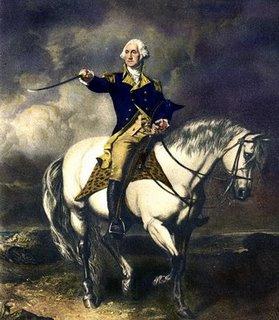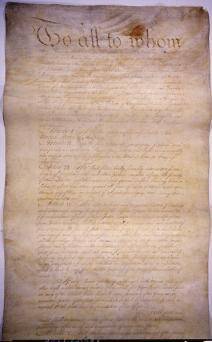Related Topics
Articles of Confederation
The Articles of Confederation were written by John Dickinson, modified by others. Officially unratified for five years, the country was ruled under them in Philadelphia, for thirteen. They taught many lessons, which we sometimes forget we had experienced.
Philadelphia Legal Scene
The American legal profession grew up in this town, creating institutions and traditions that set the style for everyone else. Boston, New York and Washington have lots of influential lawyers, but Philadelphia shapes the legal profession.
Perpetual?

|
|
George Washington Was he the 11th President of the United States? |
We must be indebted to Stanley L. Klos for his recent book called President Who? in which he makes a persuasive case that George Washington was actually the eleventh President of the United States, there have been ten previous Presidents under the Articles of Confederation. The awkward fact that the Articles were not ratified until 1781, is a different sort of issue which possibly helps explain some of the confusion.
In general, the attitude had been that the ten previous Presidents had merely been the presiding officers of Congress, holding an office we might now call Speaker. Indeed, the President under the Constitution doesn't "preside" over anything definable, although the Vice-president clearly presides over the Senate, at least on the infrequent occasions when he is in the room. All of this would seem to be nit-picking wordplay by history hobbyists, except for one thing.

|
|
Lincoln raised the issue whether states who ratified the Articles of Confederation, among other documents, were bound in perpetuity to be members of the United States. |
Abraham Lincoln was having a hard time finding a reason to challenge South Carolina's right to secede, which was later depicted by the state as simply revoking its previous ratification of the Constitution in 1789. If they could join the Union, they could un-join the Union, so, Goodbye.
Not so, said Lincoln. When South Carolina ratified the Articles of Confederation in 1778, those Articles clearly stated the Union was to be perpetual, or at least the Articles uniting the colonies were to be so. Articles of Confederation: Article XIII. Every State shall abide by the determination of the United States in Congress assembled, on all questions which by this confederation are submitted to them. And the Articles of this Confederation shall be inviolably observed by every State, and the Union shall be perpetual; nor shall any alteration at any time hereafter be made in any of them; unless such alteration be agreed to in a Congress of the United States, and be afterward confirmed by the legislatures of every State. That sounds pretty perpetual to most readers, making the Constitution merely a clarification of details, or at most an amendment to the Articles of Confederation. There is a strong implication that the intent of Article XIII was to prevent individual states from making a separate peace with Great Britain, or Britain from claiming conquered territory was no longer American.There's no doubt the Articles do say perpetual and no doubt South Carolina signed them. However, it is equally certain that Alabama, Arkansas, Louisiana, Mississippi, and Texas did not sign the Articles. Six hundred thousand casualties later, this fine legal dispute was settled in Lincoln's favor, but not before the Gettysburg Address further muddled Constitutional Law by proposing in effect that the Declaration of Independence formed the basis for the Constitution. However, a speech at a ceremony hardly qualifies as a national ratification, and the Gettysburg Address did not achieve much acclaim for several more decades, suggesting later politicians were doing some special pleading, To include either the Declaration or the Gettysburg Address in a discussion of Constitutional intent is to ignore a lot of contemporary history. Many of the clauses and even some of the wording of the Constitution is taken directly from the Articles to the Constitution, whereas the claim tracing origin in the Declaration of Independence is based on the conflict between the two in the "All men are created equal" versus the later assignment in the Constitution of only 3/5 of a vote for slaves. The party of Thomas Jefferson can only make the claim that the Declaration made an assertion which was later overturned by the Constitution, only to be reversed again by the Civil War and the Fourteenth Amendment. Only the Articles and the Constitution itself can claim to have been intended as a system of governance, with at least some attempt made to obtain general ratification, followed by long periods of conforming to them, to display even stronger ratification. It may be humanitarian, but it is not good history to assert that a Declaration is Law.
So now Philadelphia has two large, competing, institutions at either end of a long grassy Mall on Sixth Street, Chestnut to Vine. Each has a paid staff, busily organizing new points of view in competition for legal authority as well as visitors. One really must wish that Lincoln had found some other legal theory to justify military action. The Articles of Confederation, which were anyway not fully ratified until 1781, established a military alliance of thirteen otherwise fairly autonomous states. The Constitution, beginning with the words We, the People, created a nation of citizens, in 1788.
There's quite a difference, and the second was emphatically based on dissatisfaction with the first. It thus is a favorite theme for those who argue for a "living" Constitution, in which any change at all is legitimate if enough people clamor for it. My own view of this, if anyone cares, is that our Union is the only example in history where a number of viable sovereign states voluntarily and permanently surrendered their powers to become a "more perfect union". Many others have tried to do the same, starting with the French Revolution and continuing with the United Nations and the European Union. So far, every other attempt has been a failure. So I am very reluctant to see us tinker with the Constitution because the invisible balances are so subtle and largely unspoken. It may not be perfect, but so far it is unique in being the only one that seems to work. Such pious worship of a mystery seems to offend a lot of people, so let's get a little more pointed.
The greatest enemy of the Constitution at the time it was formed was Thomas Jefferson, the Ambassador to France at the time of the French Revolution, which he much admired. Jefferson was reluctant to confront George Washington, so his resistance to the Constitution was circumspect. However, he formed a political party with the main principle of opposing strong central government. One of the activities of his party was to start to celebrate July 4 as a National holiday and to downgrade the importance of Washington's birthday as one. There can be little doubt that Washington's birthday has been dropped from the national calendar and replaced by President's Day, while the celebration of July 4 continues to be an occasion for speeches and fireworks. John Adams engaged in a long correspondence with Jefferson after both had stepped down from the Presidency. While the two made their peace with each other on many subjects, Adams never forgave this celebration of the Declaration as a sacred text, when in fact he believed it had little to do with history and was outspoken in his scorn for its importance. One can only imagine the apoplectic speech Adams would give today if he could come alive and comment on the dilution of Washington's birthday with Lincoln's, diminishing the memory of both. And as for his scorn for dating the beginning of the Revolution to July 4, 1776, when in fact fighting had been going on at Lexington, Concord, Bunker Hill and other places for years, well. If it comes to a battle of documents, a respectable case can be made that the beginning of the Revolutionary War was in December, 1775 when the British Parliament passed the Prohibitory Act, effectively declaring war on the rebellious colonies, meanwhile dispatching a war fleet of several hundred ships to America to subdue us.
Originally published: Thursday, June 27, 2002; most-recently modified: Friday, May 31, 2019
| Posted by: Marina Whestly | Oct 13, 2007 4:02 PM |